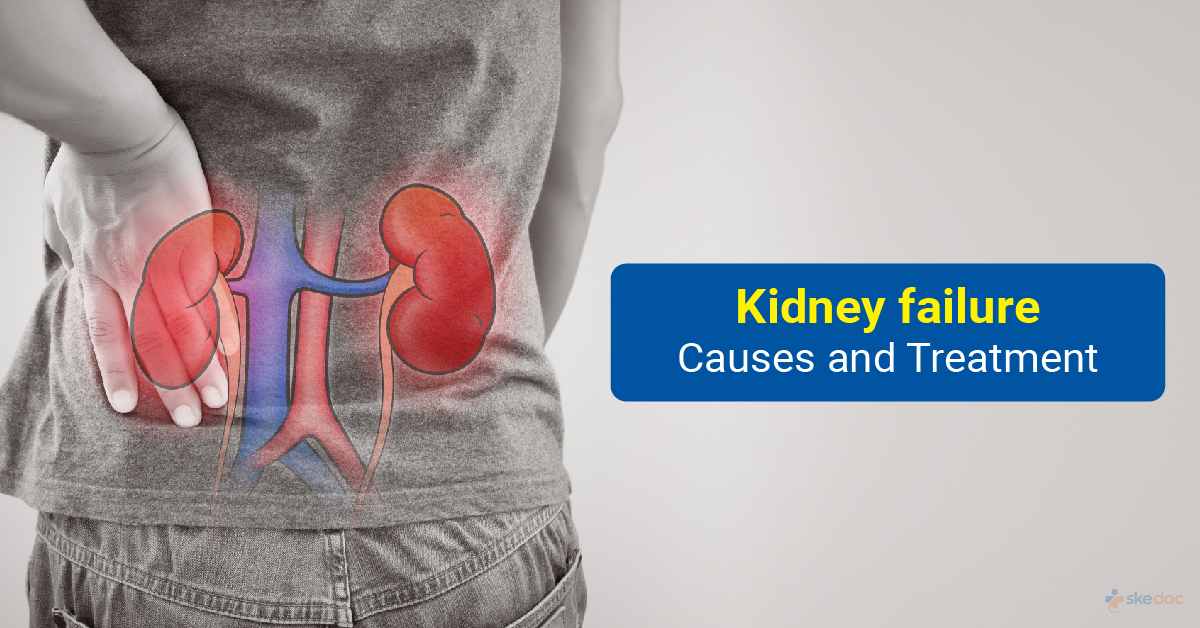Allergy
Blood Diseases
Bone & Joints
Brain
Cancer
Child Care
Cosmetic Surgery
Diabetes
Endocrinology
ENT
Eye
Gen Medicine
General Surgery
Heart
Kidney
Lifestyle
Liver & Digestive
Lung
Men’s Health
Mental health
Physiotherapy
Rheumatology
Skin and hair
Sleep Disorders
Spine
Transplant
Women Health
Thyroid
Vascular Surgery
Kidney Failure

What is Kidney Failure?
Kidney Failure, also known as Renal Failure, is a condition in which the kidneys function less than 10-15% of their normal capacity. It is a stage of kidney disease in which the kidneys can no longer function either without dialysis or the individual requires a kidney transplant. This can be rapidly progressive or may occur over time and is usually secondary to other underlying medical conditions.
Alternate names
- End-Stage Kidney Disease
- End-Stage Renal Disease
Is the kidney failure condition a medical emergency?
Kidney Failure is a medical emergency and requires prompt medical attention.
Types
Kidney Failure may be classified as,
- Acute Kidney Failure: It is rapidly progressive and can be further classified as
- Pre-Renal - It is caused by conditions that lead to a decrease in the blood flow to the kidneys.
- Intrinsic or Renal- It is caused by conditions that directly damage the kidneys.
- Post-Renal- It is caused by conditions that cause an obstruction to the flow of urine from the kidneys.
- Chronic Kidney Failure: It progresses slowly over time and may not show any symptoms initially
- Acute Chronic Kidney Failure: This can occur over pre-existing chronic kidney failure
- RPRF- Rapidly progressive Kidney failure
Causes
Kidney Failure is caused when the kidneys are damaged due to underlying medical conditions or other environmental or genetic factors. Some of these include:
- Acute Kidney Failure
- Causes of Pre-Renal Acute Renal Failure:
- Low blood volume - Dehydration, diuretics, burns, vomiting and diarrhea, bleeding, major surgery, pancreatitis
- Cardiac Disease - Heart attack, heart failure, severe heart valve disease, low blood pressure
- Infections - Sepsis
- Medication & Drugs - Anesthetics, NSAIDs, radio-contrast agents, amphotericin B, norepinephrine, calcineurin inhibitors
- Allergic reactions - Anaphylaxis
- Organ failure - liver failure, heart failure
- Vascular - Renal artery stenosis, renal vein thrombosis
- Causes of Intrinsic Acute Renal Failure:
- Vascular - Plaques and clots in renal arteries and veins, Disseminated Intravascular coagulation
- Infections - Pyelonephritis, viral nephritis, sepsis
- Drugs - Penicillin, NSAIDs, cephalosporins, chemotherapeutic agents, sulfonamides, rifampicin, radio-contrast agents, proton pump inhibitors, etc
- Glomerular disease - Glomerulonephritis
- Heme Pigment buildup - Muscle tissue breakdown (rhabdomyolysis), intravascular hemolysis, hemolytic uremic syndrome
- Crystal deposit and buildup - Tumor lysis syndrome (seen in some cancers)
- Poisoning - Alcohol poisoning, vitamin C overdose, heavy metal poisoning
- Systemic disease - Sjogren’s syndrome, Sarcoidosis, Lupus, lymphoma, leukemia, scleroderma
- Causes of Post-Renal Acute Renal Failure:
- Ureteric obstruction - Stone disease, tumor, fibrosis, ligation during pelvic surgery
- Bladder neck obstruction - Benign prostatic hypertrophy (BPH), cancer of the prostate, neurogenic bladder, drugs such as tricyclic anti-depressants, bladder tumor, and stones
- Urethral obstruction - Strictures, tumor, phimosis
- Renal vein thrombosis
- Causes of Pre-Renal Acute Renal Failure:
- Chronic Kidney Failure
- Diabetes mellitus
- Long-term uncontrolled hypertension
- Polycystic kidney disease
- Medications – Such as ibuprofen, paracetamol
- Infections with Hantavirus
Risk factors
The risk factors for developing kidney failure include the following:
- Serious medical conditions that require hospitalization and intensive care, like sepsis, acute pancreatitis, post operative case, burns.
- Elderly age group
- Peripheral artery disease
- Diabetes
- High blood pressure
- Heart failure and severe heart valve disease
- Kidney diseases
- Liver diseases
- Certain cancers and chemotherapy
- Renal stone diseases
- Congenital kidney diseases, cystic kidney diseases
Symptoms & signs
The signs and symptoms may present rapidly, as in acute kidney failure, or may present slowly over time, as in chronic kidney failure. They may include:
- Nausea and vomiting
- Loss of appetite and weight loss
- Tiredness
- Increased frequency of urination and increased urination at night
- Either low urine output or excessive urine output
- Blood in urine
- Frothy urine
- Itching
- Muscle cramps
- Back pain
- Swelling of the hands, legs, ankles, feet, and face
- Shortness of breath
- Abnormal heart rhythms
- Low blood pressure
- Muscle paralysis
- Dizziness
- Seizures
- Loss of concentration and memory loss
- Disturbed sleep
Investigations
Some investigations that are advised for the evaluation of kidney failure include:
- Measurement of urine output - The amount of urine passed in 24 hours is measured
- Complete urine examination - A complete examination of the urine, including cells, albumin/protein, sugars, blood, etc, is done
- Blood tests and Renal function tests- To measure the levels of urea, nitrogen, Creatinine, and eGFR
- Imaging tests - Ultrasound and CT scan of the abdomen may be required
- Kidney biopsy - A biopsy to obtain a sample of kidney tissue may be required in some cases. It is a daycare and safe procedure.
Diagnosis
A diagnosis of kidney failure is established based on medical history, clinical evaluation, and results of investigations done.
Course & Stages
- Acute Kidney Failure can progress very rapidly and is staged as follows:
- Risk - If the Serum Creatinine levels have increased by 1.5 times, or the eGFR has dropped by 25%, or the urine output is less than 0.5ml/kg/hour for 6 hours
- Injury - If the Serum Creatinine levels have increased by 2 times, or the eGFR has dropped by 50%, or the urine output is less than 0.5ml/kg/hour for 12 hours
- Failure - If the Serum Creatinine levels have increased by 3 times, or the eGFR has dropped by 75%, or the urine output is less than 0.3ml/kg/hour for 24 hours, or anuria (no urine output) for 12 hours
- Loss - No kidney function for 4 weeks, and requiring renal replacement therapy
- End-Stage Kidney Disease - Complete loss of kidney function and requiring renal replacement therapy for 3 months
- Chronic Kidney Failure progresses slowly and is staged as follows:
- Stage I – Mildly reduced kidney function with no apparent symptoms and eGFR over 90
- Stage II – Mild kidney damage with minimal symptoms, and eGFR between 60-89
- Stage III – Moderate damage to kidney and eGFR between 30-59
- Stage IIIa – eGFR between 45-59
- Stage IIIb – eGFR between 30-44
- Stage IV – Moderate to severe damage to kidney function, and eGFR is between 15-29
- Stage V – There is severe loss of kidney function, or the kidneys have already failed, and eGFR is less than 15
Treatment options
The treatment depends on identifying the underlying cause as well as the type and stage of kidney failure. It aims at restoring the function of the kidneys at the earliest and preventing further kidney damage.
Medical management
The medical management depends on the cause and may include the following:
- Replacement of fluids - IV administration of fluids is done as long as there is no fluid overload
- Diuretics - Such as furosemide, may be administered either to help with low blood pressure or to remove excess fluid from the body,
- Strict control of diabetes and hypertension
- Avoid ingestion of nephrotoxic drugs/pain medications and diet
In addition, stopping medication or drugs that are causing kidney damage and starting medications or drugs such as steroids or cyclophosphamide to help with the management of vasculitis or glomerulonephritis may also be done.
Interventions:
The following interventional procedures may be done:
- Foleys catheterization may be done to monitor urine output and rule out bladder pathologies.
- Placement of a central venous catheter - A central venous catheter may be placed to assess the volume status of body fluids to avoid over or under replacement
- Dialysis or Renal Replacement Therapy - May be required to remove the excess fluid, toxins, or potassium from the body. This may be done either intermittently or continuously until the kidney function improves. There are many forms of HD - SLED, SCUF, CVVHF, CVVHDF, and CRRT.
- Kidney transplantation –It is the last resort when all other measures fail to improve kidney function. It is the only curative treatment for renal failure.
In addition, if the cause of failure is due to an obstruction to the outflow of urine, surgical intervention is required to remove the obstruction. Surgical procedures such as a DJ stenting for renal calculi and nephrostomy may be done.
Role of Diet/ Exercise/ Lifestyle changes/ Preventive measures
Eating a healthy diet and maintaining a healthy lifestyle are important in the prevention of kidney disease. The following may help to reduce the risk of Kidney Failure:
- Strict control of diabetes and high blood pressure
- Low salt diet
- Exercising and maintaining an ideal body weight
- Avoiding unnecessary and unadvised use of painkillers and over the counter medications for pain relief
- Decreased intake of alcohol
- Regular monitoring of proteinuria in case of diabetes, hypertension, and other comorbidities
Complications
The complications of kidney failure may include:
- Fluid overload - Fluid accumulation in the lungs can occur, leading to shortness of breath, pulmonary edema, and cardiac failure
- Chest pain and discomfort- Angina, arrhythmias
- Anemia - Easy fatigability
- CKD-MBD - Bone mineral disease, high/low turnover bone diseases, osteoporosis, and osteomalacia are common in CKD
- Muscular weakness - Altered electrolyte and fluid imbalance can lead to extreme muscular weakness
- Metabolic acidosis
- Progressive Kidney damage
Prognosis
The prognosis for Kidney Failure depends on the underlying cause and the type of Kidney Failure. Early identification, management, and prevention can help to improve the prognosis of chronic kidney failure. The prognosis for acute renal failure is poor, and the death rate is very high, especially in individuals who develop it after major surgeries on the heart or abdomen. Permanent kidney damage is also very high after acute kidney failure, and a lot of individuals would require lifelong renal replacement therapy or dialysis, thus affecting their quality of life.
When to contact the doctor or hospital? / How to identify the emergency or complications?
Acute renal failure is a condition that requires immediate medical attention, and it is, therefore, very important to contact a doctor as soon as the symptoms and signs of acute kidney failure are seen, especially reduced urine output, shortness of breath, irregular heartbeat, confusion, and weakness.
Indications for hospitalization if required
Depending on the type of Kidney Failure that is present, hospitalization may be required. Acute kidney failure almost always requires hospitalization.
Suggested clinical specialist/ Department to consult for this condition
- Nephrology
Was this article helpful?
YesNo




